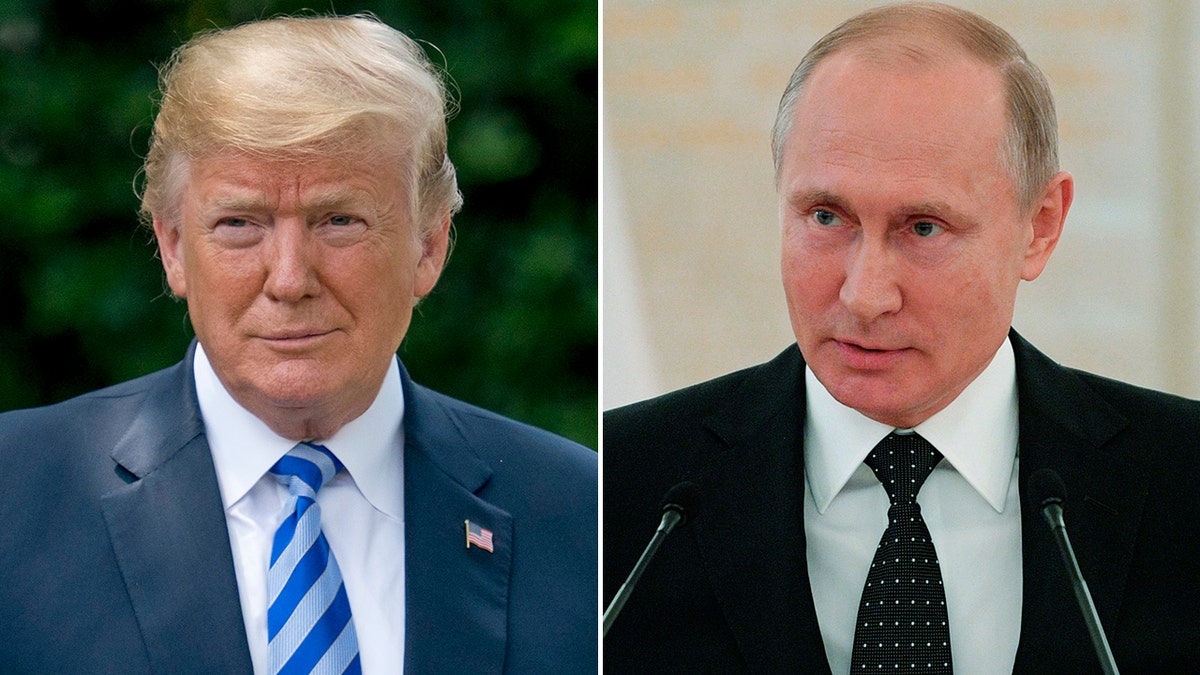
President Trump, left, is slated to meet with Russian President Vladimir Putin, right, next Monday. (AP)
When President Trump and Russian President Vladimir Putin hold a summit in Helsinki, Finland on July 16 they will have plenty to discuss – including Russia’s annexation of Crimea, support for separatists in Eastern Ukraine, intervention in the Syrian Civil and meddling in our 2016 presidential election. Here’s one more agenda item for the summit: Russia’s human rights abuses.
More than a year ago, I wrote in an op-ed for Fox News about the plight of Alexey Pichugin, Russia’s longest-serving political prisoner and a pawn in Putin’s ruthless game to wield unchallenged power in Russia.
As I wrote: “The destruction of Mr. Pichugin’s life over the past 14 (now 15) years is a tragedy that has become too common in Mr. Putin’s Russia. The chilling lesson is that it is not necessary to be a political opponent of Mr. Putin to feel his wrath. It is enough to be associated with a perceived enemy of the President, or to be seen as someone through whom the Putin can exact some revenge, or some punishment, or set an example for others. Mr. Pichugin’s story presents a window into the true nature of the Russian President and into the dire circumstances of freedom and the rule of law in Russia, on whose neck (like Mr. Pichugin’s) Mr. Putin now firmly has his boot.”
And still, like 150 other Russian political and religious prisoners identified by the U.S. State Department, Pichugin sits in his cell, a prisoner in the notorious Black Dolphin facility. This is despite the fact the Pischugin is recognized as a political prisoner by the Memorial Human Rights Center, the Lantos Foundation for Human Rights and Justice, and the Raoul Wallenberg Centre from Human Rights.
In May, Russian human rights activist and Putin poisoning victim Vladimir Kara-Murza made a plea to the British Parliament for that country to enact a Magnitzky Act, a law modeled on the U.S. statute that seeks to deter Putin by refusing visas and access to Western markets to Putin’s cronies who execute his human rights abuses.
Kara-Murza specifically noted Pichugin’s plight, among others who Putin has attempted to silence and punish – not for what they have done, but because of who they are, with whom they associate and what they believe.
Our goal must be to free not just Alexey Pichugin and the 150 names on the State Department list, but to also unlock human rights and dignity in Russia.
Through my 36 years of service to the United States – first as a Marine Corps aviator and then either on the street or in command positions with the FBI – I have committed my life to the preservation of democracy and the rule of law. For that reason, it is unacceptable to me to watch the Putin administration trample the law and human rights in Russia.
More must be done – and not just for Pichugin, who is by no means Putin’s only victim.
So as Presidents Trump and Putin prepare for this historic summit, there is more that our president and the U.S. can do.
We can start by not pretending that Russia is just another country in the community of nations. And we must expand sanctions under the U.S. Magnitzky Act – including the jailers and judges, police and prosecutors, responsible for cases like Pichugin’s.
Only these restrictions on the benefits of Western markets and participation in the community of nations will get Putin’s attention.
We must attack Russian kleptocracy in its pocketbook, making it harder for those who support and carry out Putin’s excesses to move their money into Western banks; harder to enroll their children in posh schools in New York City and London; and harder to acquire homes and hideaways in the most vibrant cities and lovely resorts in the world.
Our goal must be to free not just Alexey Pichugin and the 150 names on the State Department list, but to also unlock human rights and dignity in Russia. Only this will remove Putin’s boot from the neck of freedom and mark the coming summit as a true turning point in world events.








































